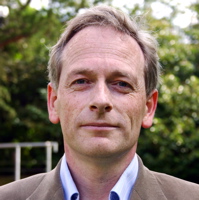Professor Richard McMahon
Richard McMahon is a Professor at the Institute of Astronomy, and a founding member of Supernova Cosmology Project (SCP) team that discovered the accelerating expansion of the Universe through observations of distant supernovae.
The team leader Saul Perlmutter was awarded the 2011 Nobel Prize in Physics for this discovery. Professor McMahon was awarded the 2015 Breakthrough Prizes In Fundamental Physics and the 2007 Gruber Prize for the discovery of the accelerating Universe shared with members of the Supernova Cosmology Project.
The main focus of Professor McMahon’s current research is in the study of galaxy formation and evolution in the Epoch of Reionization; focusing on the discovery of high redshift galaxies and quasars powered by the accretion of matter onto supermassive black holes. He works on the discovery of quasars and active galaxies that host supermassive black holes, the determination of the space densities, star formation rates and how and when galaxies and quasars form. In the past he has worked on the experimental determination of the rate of gravitational deceleration of the Universe. This work resulted in the unexpected discovery that the expansion of the Universe is accelerating.
His research also includes developing experimental survey techniques for discovering new high redshift quasars and using quasars to probe the baryonic content of the Universe. His group has pioneered the use of high redshift quasars to determine the mass of neutral hydrogen in the high redshift Universe via intervening absorption lines imprinted on the spectra of background high redshift quasars. He has also pioneered the use of mm and submm microwave radiation to determine the star formation rate in quasar host galaxies.
He is Principal Investigator (PI) of the ambitious VISTA Hemisphere Survey(VHS) which is a new near Infra-Red sky survey project which started in April, 2010. The has been been awarded 300+ clear nights over a 5 year period on the new 4.2m ESO VISTA telescope in Chile. He leads the quasar science working group in the Dark Energy Survey(DES) project which is building a very large CCD camera (DECAM) and has been awarded 500 nights on US CTIO 4m telescope in Chile to use this camera to observe in the optical the VHS region of the sky.
The exploitation of the extremely large datasets from these new surveys requires the use and development of robust data-mining techniques for distributed databases; machine-learning techniques such as decision trees, supervised learning and multi-dimensional data visualisation techniques.
